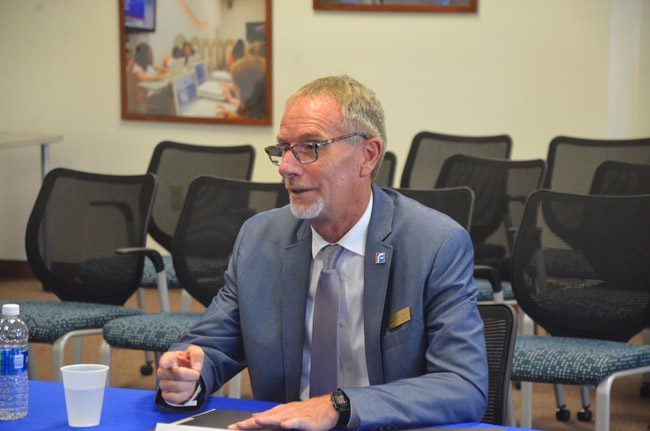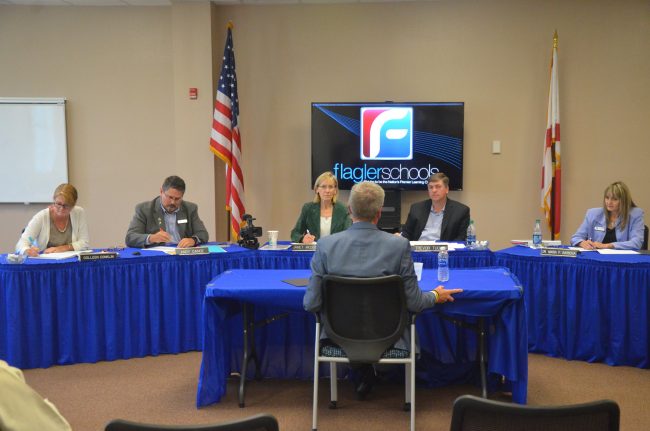
James Tager had several advantages walking into his interview for superintendent after lunch this afternoon, the last of the day for the Flagler County School Board.
He had just visited a couple of schools in the district and could make direct references to what he’d seen, as his two competitors this morning could not. As a long-time administrator in Volusia County schools, he was conversant with Flagler not just as a neighboring school district, where he’s on a first-name basis with several officials, but as a community. He grew up in New Smyrna Beach, went to school at Flagler College, and lives in Port Orange, making Flagler familiar territory he’s crisscrossed over the years.
And there was this: he was the only candidate chosen by all five school board members to be interviewed. Jeff Umbaugh, first to be interviewed today, was chosen by three, Gerald Wilson by two. Tager, 57, did not make the board’s unanimity seem out of place: he was relaxed, commanding, fluent in the facts and complexities of Florida’s financial and accountability systems, but also less inclined to rely on bureaucratic lingo. (Judging from notes they took during the interviews, one board member described Tager’s body language as “comfortable,” “relaxed,” “good eye contact,” “moderate/good animation” and “confident.”)
His longest answer was about the difference faculty’s direct intervention in struggling students’ lives can make to improve performance and getting to graduation. (Unlike his two predecessors, Tager did not knock the county’s graduation rate, terming it fair.)
He described how at Atlantic High School, where he’s the principal, a group of faculty, himself included, meet at the end of each quarter with every student who has one F or more. “It’s not a troublesome meeting for the student, it’s a ‘we’re here to help you’ meeting,” he said. Anything that can be done differently to improve graduation chances is attempted, from altering the schedule to providing a mentor, Tager included. The method’s monikers are a bit hokey (that meeting is called a “shark attack,” because the school’s mascot is a shark, a more intensified intervention sends students to “the bunker,” where the school pays teachers extra to provide further tutoring) but it’s worked, raising the school’s graduation rate for all categories of students. “It’s about students, it’s about their families, it’s about faculty and staff, and I think you change somebody’s life when they graduate,” Tager said, describing that achievement in some of the more evocative words interviewees used today: the human element was apparent behind Tager’s stats.
Tager spoke from outlines he’d prepared and used the previous evening during a meet-and-greet with members of the community at Buddy Taylor Middle School. It included what he called his 100-day plan (a conceit once limited to particularly successful presidents but now coloring the gimmickry of new executives in many fields): He wants to focus on improving the “graduation rate for all subgroups,” increase Advanced Placement enrollment for all students (he did not mention the IB program), improve the district’s rather dismal standing, relative to other counties, in earning industry certifications for students in vocational fields, and examining the district’s special education approach. He was basing the plan on what he’d gleaned from the citizens’ survey the school board conducted during its search for candidates. Tager’s ideas about improving the graduation rate were clear. His ideas regarding the three other initiatives were less so.

In terms of innovations, he was more animated about “academies,” what Flagler has called its Flagship programs. The Volusia district is following the same direction, with a mandate for an increasing number of “academies,” or schools within schools that focus on specific fields–
technology, engineering, science, aeronautics (he noted the similarities between some programs at Atlantic High and at Flagler Palm Coast High), aerospace, aquaculture, law and order.
The five board members asked Tager the very same questions they’d asked previous candidates—just two questions per board member, which limited the range of what was asked and left out all questions about the candidate’s own character, disciplinary philosophies, transparency, or even board dynamics (a sore point currently on the school board, which may have caused at least some candidates to drop out). So several questions ended up illuminating how much the candidate knew rather than what he would do, or how (the only woman to make the final cut for interviews withdrew.)
Tager, of course aced the question on how Florida budgets and what “FTEs” mean—the acronym that stands for “full-time equivalent” students, and that defines how much money a district gets from the state—and used the question to remind board members that he’s gone through cost-cutting years as an assistant superintendent. A question about how he defines the primary “customer” of the school district led him to place students first, but not to the exclusion of faculty, staff, residents and businesses. He then said he would hold forums at the middle and high schools as a new superintendent to better understand the district.
“I’m not here to be Jacob’s cheerleader but he’s a hard guy to follow,” Tager said. But when asked how visible he’d be in the schools, he said he hopes to be in schools “at least one day a week.” That would be a significant departure from Oliva, who early on made a point of being a roving superintendent—one more likely to be in a school or in someone else’s office than at his desk in the district office. He has no such desk in his office, to make the point.
On school testing, Tager called it “the necessary evil of assessments,” finding plenty of value to testing, but only if it’s then used to guide further instruction. And he again denoted a level of discomfort with reducing students to numbers or abstractions: “The students certainly are not a standard. We are here to teach students,” he said, referring to their social, emotional and academic needs. “At the same time I will tell you that there are standards that need to be taught to keep up the level of excellence the community expects for Flagler County schools.”
![]()
Click to access 26-James-Tager-031417-R.pdf





























wishful thinking says
I like ths guy. He did his homework by visiting the schools he is hoping to reign. He tops ’em all….in my book